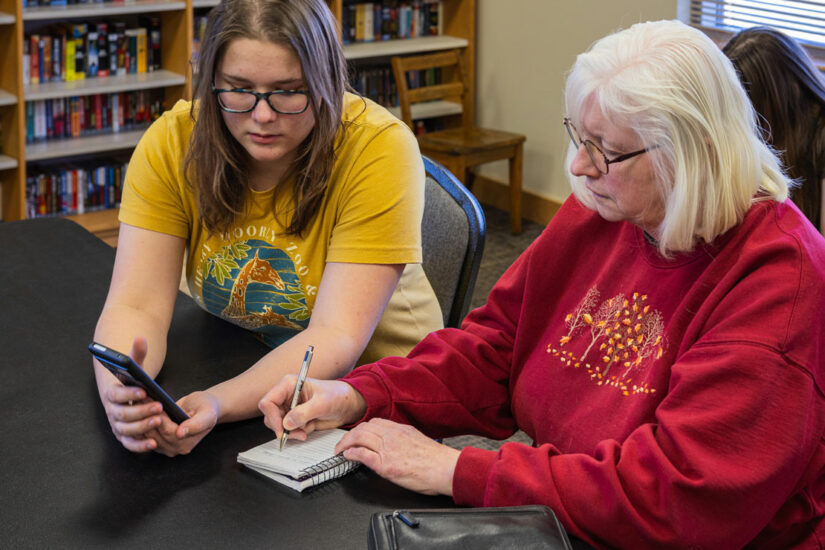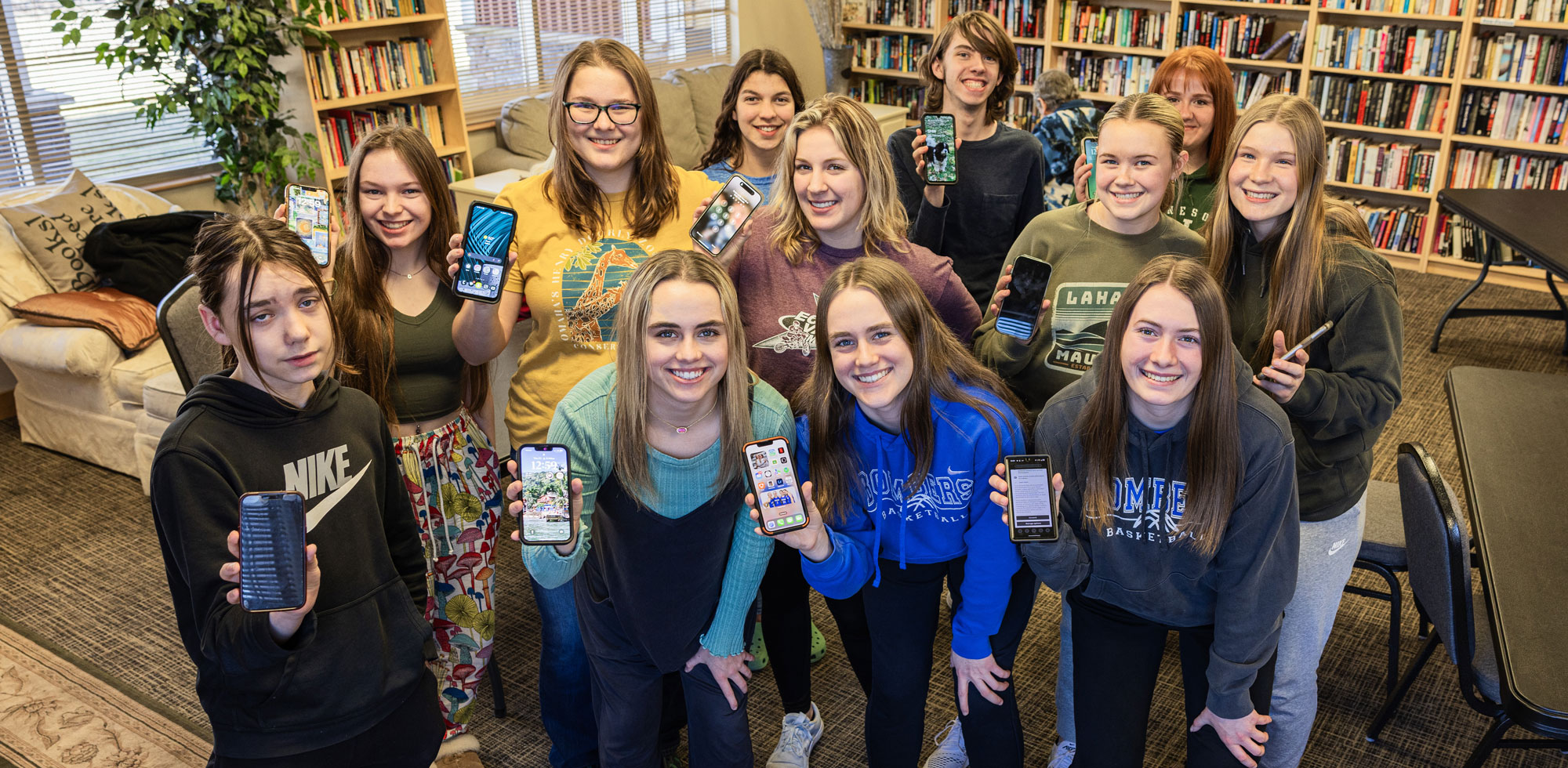
Smartphone Sessions
Braham high schoolers teach digital tech to older residents—and get an education of their own
By Gene Rebeck | Photography by John Linn
The pandemic made human connections more difficult, and more precious. Digital technology—smartphones, tablets, and video conferencing applications such as Zoom—provided some connectivity during lockdown. And it’s continuing to connect us now that COVID-19 has receded.
But what if you don’t know how these handy devices work?
For the past couple of years, older residents in Braham and the surrounding area have been learning how to make digital connections with friends, family, and communities of interest. You could call it seniors helping seniors. “We just call it our smartphone class,” said Kelly Nelson, event coordinator for the Braham Event Center. During several evenings throughout the school year, students from Braham Area High School come to the event center to help older community residents master their electronic devices.
They’re making face-to-face, head-to-head and heart-to-heart connections. And everyone is benefitting.
Getting started
The idea for the smartphone class originated several years ago with the committee that oversees the Alice Studt Library, which operates within the Braham Event Center. It is not a public library per se, though the 27-by-27-foot space operates much like one. It lends out books and provides workspace, including wi-fi, computer access, and digital printing. The public library’s outreach van visits once a week to pick up and return books and other borrowed resources.
As Hanson recalls, a committee member mentioned having difficulty mastering his smartphone. Other members quickly nodded in agreement: “All we do is sit around and talk about how we can’t figure out a QR code or how to send a text message,” he said.
The conversation reminded committee member Gary Skarsten of a story he read about high school students providing digital device training to older adults. “I thought, ‘I’m going to suggest that idea to the library committee,’” Skarsten said. The committee was quickly onboard, and so was the school superintendent. Then the pandemic hit, and the idea was idled until late 2022 when the globe-stalling virus appeared to finally be in retreat.
As they revived the idea, committee members contacted Tammi Johnson, dean of students and Student Council advisor at Braham Area High School. “The Student Council has always been good about doing a variety of activities to support the community,” she said. Johnson took the idea to Student Council members, and they, too, responded enthusiastically.

Class in session
The first class in October 2022 was attended by about a dozen older adults. “There’s no formal lecture,” Nelson said. “It’s just pairing up and saying, ‘Hi, do you have any questions about your iPad or your Android or your iPhone?’” Some attendees have specific questions. Others, Nelson noted, take a more resigned approach and simply say, “‘Show me how to work this thing.’”
The hour-long classes occur about four times during each school year with a break during the summer months. Attendees can stay for a full session, or they can get their questions answered and be in and out in under 30 minutes. On average, seven to eight people attend. “There are a few returnees who want to keep learning,” Nelson said. “And others are one and done—‘I got what I needed.’”
Making connections
Madison Davis, a Braham Area High School senior and president of the Student Council, participated in her first smartphone class last October.
“I thought it would be a good opportunity to give back to the community,” Davis said. “A lot of the people who’ve signed up for these classes are people who also work at the community center, and they have always been good to me and supportive of my volunteering and my basketball.” (She’s a member of the girls varsity basketball team.)
Davis fondly recalls one of her first students. “She had never used a smartphone before. I showed her basic things, like how to set up wi-fi, how to make a text message, how to send one, how to call friends and family, how to leave voicemails, how to set up contact information.” Davis also showed her how to use the maps function for getting directions to the places where she needed to go.
“I like the feeling of using my skills to help others,” Davis said. And she found it satisfying and gratifying to see the relief on her student’s face “when she started to understand it—to see her succeed and be able to do it on her own. That was really fun for me.”
“The students are the best teachers,” Skarsten said. “They are cell phone experts, and they are so good with adults—with senior citizens.” So good, in fact, that some attendees return for additional sessions.
Cambridge resident Karen Anderson is one of those repeat attendees—and it’s not for the free cookies. A flip-phone user until a couple of years ago, Anderson’s upgraded to a smartphone and realized it came with a steep learning curve. The educational arc was complicated by several small strokes that left Anderson with some short-term memory challenges. Her student helpers, whom Anderson calls “lovely,” “marvelous” and “helpful,” accommodated her needs by writing out their instructions.
“Without the cheat sheets these students created for me, I wouldn’t know how to use my new [phone],” Anderson said, keenly aware that the high school students “have been using technology since they were tiny. We senior citizens are the ‘newbies’ in this case.”
Working together, the high-schoolers and their smartphone students are bridging gaps in understanding while closing generational gaps and building new relationships. “Almost every person who has come has said that they’re going to come back when they get a new cell phone,” Skarsten said. “They say, ‘Please continue the class. It is so helpful.’”
Anderson couldn’t agree more. “You know, sometimes, we only see the negative,” she said, “but these kids are going to get ahead, because they are amazing.” Then she added with a delighted laugh, “Otherwise, they wouldn’t take the time to work with us old people.”